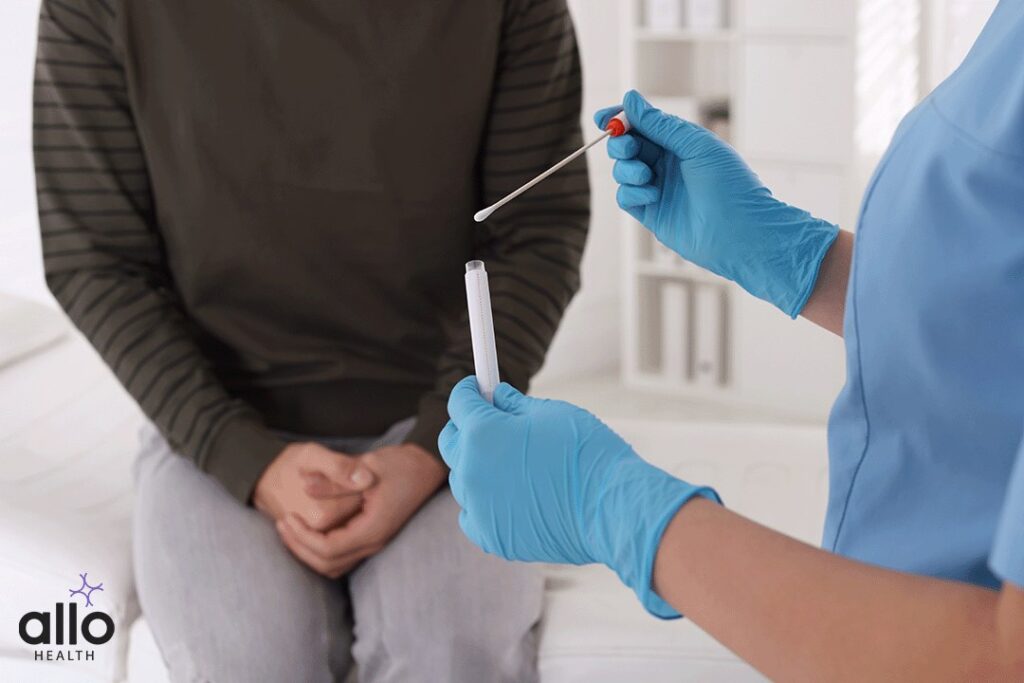Can An STD Give You Erectile Dysfunction

Allo Health is dedicated to personalized well-being, offering support and trusted information tailored to individual health goals. The platform emphasizes human-generated content, led by a distinguished medical team of experts, including physicians and sexual health specialists. Their commitment to credibility involves rigorous fact-checking, authoritative research, and continuous updates to ensure accurate, up-to-date information. Allo Health's unique approach goes beyond conventional platforms, providing expert-led insights and a continuous commitment to excellence, with user feedback playing a crucial role in shaping the platform's authoritative voice.

An early career psychiatrist with extensive experience in general adult psychiatry, relationship issues, psychosexual problems & special interest in sexual medicine, disorders with addictive behaviours and Obsessive Compulsive disorders. He is an astute physician with excellent academic record and research experience. He is also a member of World Health Organisation and World Psychiatric Association. His vision and goal for Allo is an inclusive, accessible digital health clinic for psychosexual difficulties.
Why This Was Upated?
Our experts continually monitor the health and wellness space, and we update our articles when new information became available.
Updated on 17 April, 2024
- Article was updated as part of our commitment to diversity, equity, and inclusion.

"The following blog article provides general information and insights on various topics. However, it is important to note that the information presented is not intended as professional advice in any specific field or area. The content of this blog is for general educational and informational purposes only.
Book consultation
The content should not be interpreted as endorsement, recommendation, or guarantee of any product, service, or information mentioned. Readers are solely responsible for the decisions and actions they take based on the information provided in this blog. It is essential to exercise individual judgment, critical thinking, and personal responsibility when applying or implementing any information or suggestions discussed in the blog."
STD And Erectile Dysfunction
Did you know that in most cases, erectile dysfunction is caused by physical and mental health conditions, including hypertension (high blood pressure), cardiovascular disease, depression, and anxiety? Age and degree of activity are two more characteristics that may affect ED.
Can, however, STDs lead to erectile dysfunction? Even though not all STDs cause erectile dysfunction, several, including gonorrhoea, chlamydia, viral hepatitis, and HIV, can result in infections in your prostate that can impair your ability to get an erection and engage in sexual activity.
To discover more about the link between ED and STDs, let’s read on.
What Is An STD?
STD stands for Sexually Transmitted Disease. It is a term used to describe a range of infections that are transmitted through sexual contact, including vaginal, anal, and oral sex. Some of the most common STDs include:
- Chlamydia
- Gonorrhea
- Syphilis
- Herpes
- Human Papillomavirus (HPV)
- HIV/AIDS
Causes
STDs are caused by bacteria, viruses, and parasites, and can have a range of symptoms, including painful urination, discharge from the penis or vagina, sores or rashes, and pain during intercourse. In some cases, individuals with STDs may not show any symptoms at all.
What Is Erectile Dysfunction?
Erectile dysfunction refers to having difficulty in achieving or maintaining an erection firm/hard enough for sexual intercourse all or most of the time.
The symptoms of erectile dysfunction (ED) can include:
- Difficulty getting an erection
- Difficulty maintaining an erection
- Reduced sexual desire
- Troubles with sexual function or performance
- Anxiety or depression related to ED
- Reduced or absent spontaneous erections
- Low self-esteem or insecurity related to sexual performance
Causes
There are many possible causes for erectile dysfunction (ED), which can be physical, psychological, or a combination of both. Some common causes include cardiovascular diseases, diabetes, neurological conditions (like Parkinson’s disease and spinal cord injuries that affect the nerves that control erections), effects of certain medications, psychological factors, poor lifestyle choices or a sedentary lifestyle etc.
The Linkage Between STD And ED
So, are erectile dysfunction disorders caused by sexually transmitted diseases? Most STDs don’t seem to affect your ability to erection in any way directly. Some, however, can be the root of or exacerbate other medical conditions that lead to erectile dysfunction.
For instance, certain illnesses transmitted during sex have the potential to result in prostatitis, an inflammation of the prostate gland. You risk finding it challenging to keep an erection firm enough for sex if this inflammation worsens.
Other urogenital and sexual symptoms, such as pain when peeing or ejaculating, can also be brought on by prostatitis. Your sexual health, as well as your general quality of life, may be impacted by these problems.
Can Gonorrhea Cause ED?
Yes, in some instances. A bacterial infection called gonorrhoea is transmitted through intercourse. It is one of several bacterial STDs that can spread to your prostate gland and give rise to erectile dysfunction symptoms.
Symptoms –
- Discharge from the penis that is white, yellow, or green
- When urinating, there is pain, discomfort, and a burning sensation.
- Testicles that are painful or swollen
If you begin to encounter any of the symptoms above, it is crucial to consult your healthcare physician because gonorrhoea is treatable with medication.
Can Chlamydia Cause ED?
Chlamydia is an infection brought on by the Chlamydia trachomatis bacterium. It is often transmitted through sexual contact, just like other STDs.
Not everyone with chlamydia experiences symptoms. Men with symptomatic chlamydia may have discharge from the penis and rectum, pain or tenderness in the testicles, and a burning sensation while peeing.
Chlamydia can move to the prostate gland, which may result in prostatic inflammation that either causes or contributes to ED.
Chlamydia can be treated, just like gonorrhoea. If you experience any chlamydia symptoms after sexual activity, it’s crucial to consult your doctor as soon as possible.
Other STDs and ED
Other STDs may impact your sexual desire, health, and performance. However, little research has been done on the relationship between most STDs and your capacity to obtain and maintain an erection.
Other STDs may lead to long-term health problems that impact your sexual health and cause sexual dysfunction.
For instance, hepatitis C (or other viral hepatitis) is linked to a higher risk of numerous cancer types, such as prostate cancer. Although prostate cancer does not directly cause ED, most prostate cancer treatments, including surgery, can exacerbate the condition.
Infections that affect the tissue surrounding your penis and result in erectile dysfunction can be brought on by other sexually transmitted illnesses, such as HIV, which can assault your immune system and impair its correct functioning.
Treatment For Erectile Dysfunction And STDs
Erectile dysfunction (ED) and sexually transmitted diseases (STDs) are two separate conditions with different causes and treatments.
Treatment for ED
- Medications: There are several oral medications, such as sildenafil (Viagra), tadalafil (Cialis), and vardenafil (Levitra), that can help improve ED by increasing blood flow to the penis.
- Lifestyle changes: Making healthy lifestyle choices, such as eating a balanced diet, exercising regularly, quitting smoking, and reducing alcohol consumption, can also help improve ED.
- Psychological counselling: For some men, ED may be caused by psychological factors, such as anxiety or depression. In these cases, psychological counselling may be helpful.
Treatment for STDs: The specific treatment for an STD will depend on the type of infection, but may include:
- Antibiotics: Many STDs, such as chlamydia and gonorrhoea, can be treated with antibiotics.
- Antiviral medications: STDs caused by viruses, such as herpes and HIV, are typically treated with antiviral medications.
- Surgery: In some cases, surgery may be necessary to treat STDs that cause genital warts or other physical symptoms.
It’s important to get tested for STDs and to seek treatment as soon as possible to prevent the spread of the infection and to protect your sexual health. If you are experiencing symptoms of ED or an STD, it’s important to speak to a doctor or healthcare provider for a proper diagnosis and treatment plan.
How To Approach An STD Paired With ED?
Sexually transmitted illnesses can significantly harm your health. They sometimes even impact your capacity to achieve and keep an erection.
It’s critical to contact your healthcare physician as soon as you suspect you may have gonorrhoea, chlamydia, or any other STD. They’ll be able to check you for STDs and, if necessary, give medication to aid in healing the condition.
Still, trying to figure out where to begin? Our team at Allo Health can give you more information on the top ways to treat ED.







































